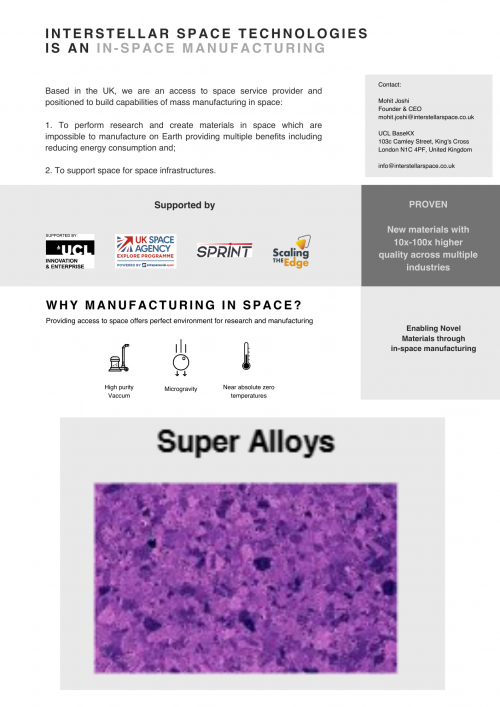- Mohit Joshi
- Responsive
- Posted by
Desired outcome
Develop a miniaturized, energy-efficient, and reliable manufacturing process for producing high temperature super alloys in space. Design and prototype a small factory capable of operation in microgravity conditions in earth's orbit to produce specified quantities of alloys for return to Earth.
Initial Problem Description
Interstellar Space Technologies is building an access to space service for manufacturing in space and seeks to revolutionize the manufacturing of high temperature super alloys by establishing a space-based production facility. The primary challenge lies in engineering a system that can operate efficiently and reliably in microgravity conditions while meeting stringent energy requirements. Teams must innovate solutions to address material handling, process optimization, and quality control, ensuring the manufactured alloys meet Earth's industrial standards. Initial design should as miniaturised as possible - with scalability of size and production in mind.
Context
The demand for high temperature super alloys continues to rise across various industries, including aerospace, energy, and automotive, driven by the need for materials with exceptional mechanical properties and corrosion resistance at elevated temperatures. Conventional manufacturing methods face limitations in producing these alloys with extremely high quality compared to that could be made on earth in the absence of microgravity environment. Establishing an in-space manufacturing capability presents a transformative opportunity to overcome these limitations by leveraging the unique conditions of space to produce high-quality alloys with enhanced properties.
Connection to cross-cutting areas
This challenge intersects with Industry 4.0, digitalization, and sustainability in several key aspects. Designing a space-based manufacturing facility requires the integration of advanced automation, robotics, and additive manufacturing technologies to operate autonomously and adaptively in the absence of continuous human oversight. Furthermore, the pursuit of in-space manufacturing aligns with the principles of sustainability by exploring alternative production methods that minimize environmental impact and resource consumption. Additionally, the development of novel manufacturing processes for high temperature super alloys contributes to advancing materials science and engineering, driving innovation across multiple sectors.
Input
Yes. We can provide students with scenarios illustrating the escalating demand for high temperature super alloys across key industries like aerospace, energy, and manufacturing. These scenarios should underscore the limitations inherent in conventional Earth-based manufacturing methods, emphasizing the need for disruptive solutions like in-space manufacturing. Additionally, insights into the latest advancements in space technology, such as reusable spacecraft and in-situ resource utilization, will offer valuable context for understanding the feasibility and potential of our challenge. Also, we can share multiple real applications of use case we are aiming for.
Expectations
We expect the solution to our challenge to progress towards an ingenious and holistic approach that effectively addresses the complexities of in-space manufacturing. Beyond delivering a viable solution, we anticipate the team to furnish comprehensive analyses of their proposed manufacturing process, encompassing utility assessments, risk mitigation strategies, and a clear roadmap for execution. We value creative problem-solving, the ability to adapt to unforeseen obstacles, and a steadfast commitment to sustainability and safety in the team's strategy.
Desired Team Profile
Our ideal team composition would comprise individuals with diverse expertise spanning aerospace engineering, materials science, manufacturing process engineering, robotics, automation, and additive manufacturing. We highly value academic backgrounds in relevant disciplines such as mechanical engineering, space systems engineering, metallurgy, and computer science. Moreover, experience in project management, systems integration, and space mission design will significantly enhance the team's capability to address the multidisciplinary challenges inherent in our project.
Additional Information
Prior to commencing their work, teams should familiarize themselves with the competitive landscape within the aerospace and materials industries, particularly regarding high temperature super alloys. Insight into ongoing mergers, acquisitions, and partnerships in these sectors will provide valuable strategic intelligence. Furthermore, teams should delve into understanding the intricacies of in-space manufacturing for terrestrial applications, including the unique challenges posed by the space environment such as microgravity, vacuum, and radiation, along with the limitations associated with operating in such conditions. It's crucial to explore the benefits of manufacturing super alloys in space, such as the potential for producing materials with enhanced properties due to the absence of gravity-induced segregation and the utilization of space resources for manufacturing processes. Understanding these factors will inform the team's approach to designing an effective and sustainable in-space manufacturing solution for high temperature super alloys.
Related Keywords
About Mohit Joshi
Interstellar Space Technologies is a London based company focused on in-space manufacturing and construction, to provide access to space and spread the benefits it can provide. We are proud to be supported by UCL Innovation & Enterprise and UK Space Agency Explore Programme.
Building upon the decades of research at International Space Station and technological advancements, we are building an access to space service of in-space manufacturing for both, to create advanced materials in space that are impossible to manufacture on Earth to provide multiple advantages, and support space for space infrastructure.

You need to sign up to apply to this challenge and submit a motivation letter!

Learn more about the topics and find team members!
Help
Need help submitting your proposal or have questions regarding this Open Innovation Challenge?
Contact support

